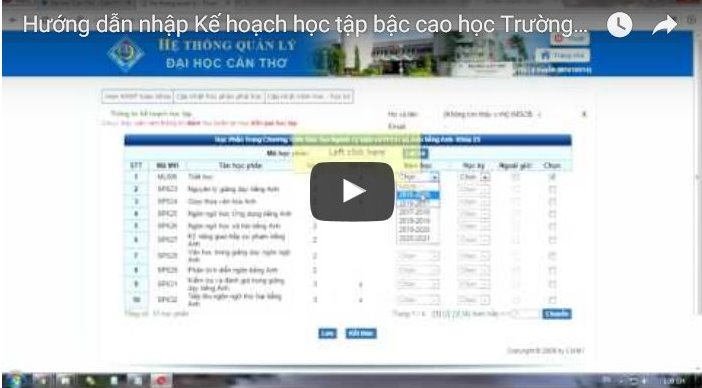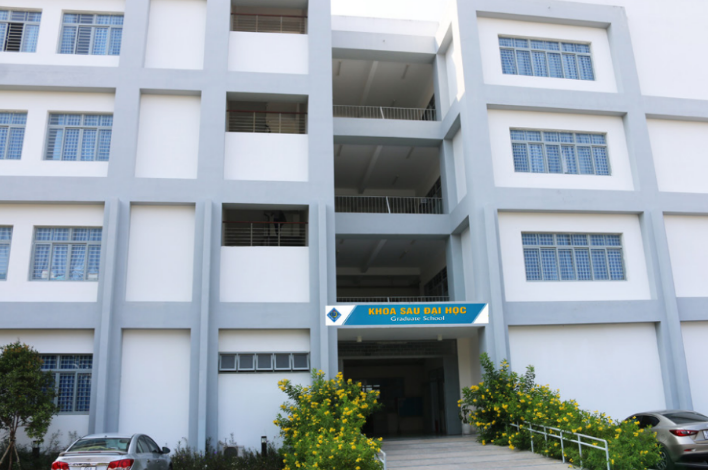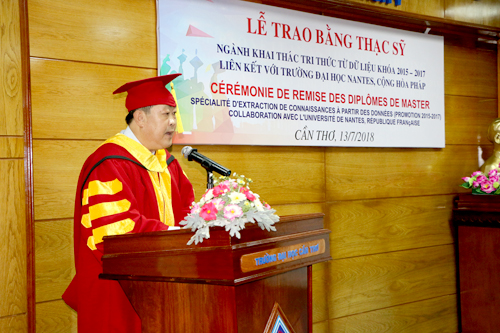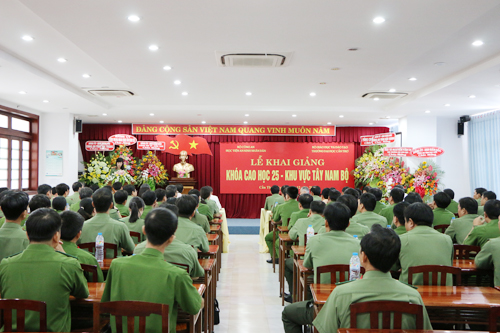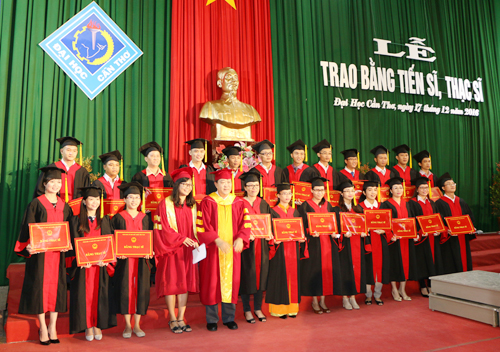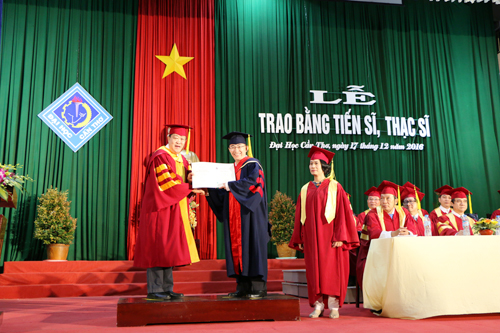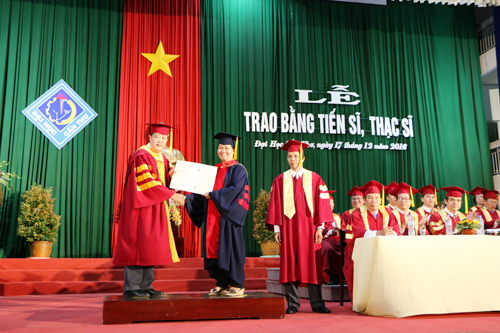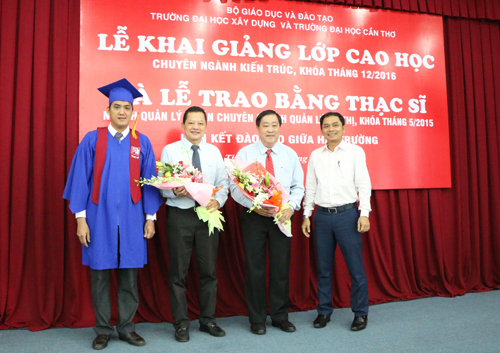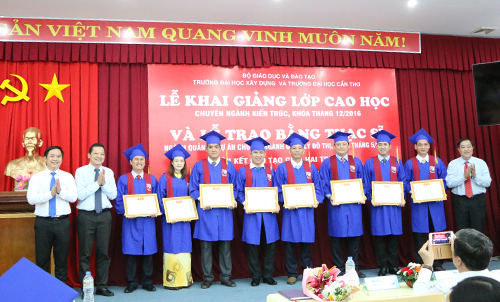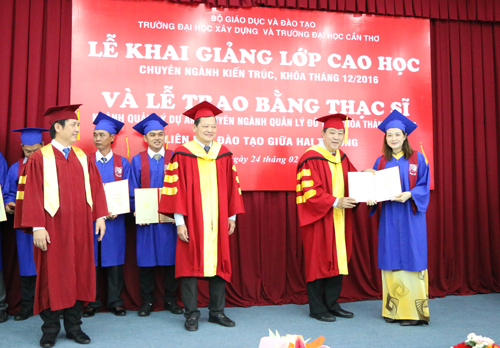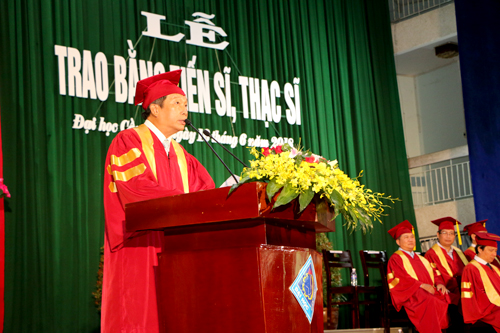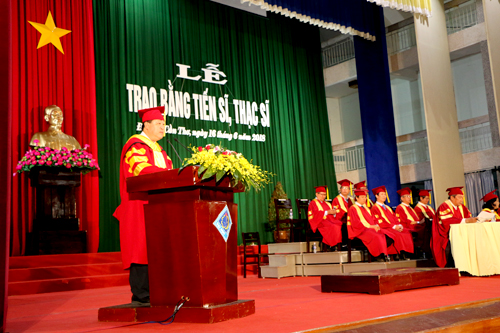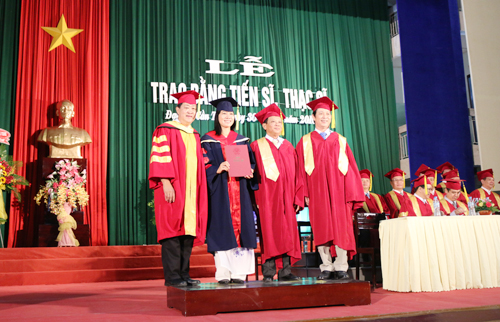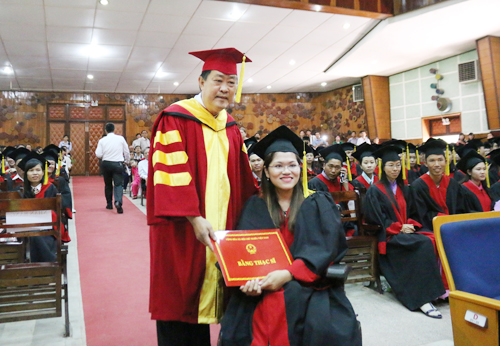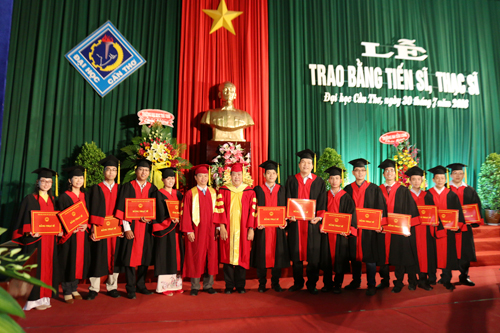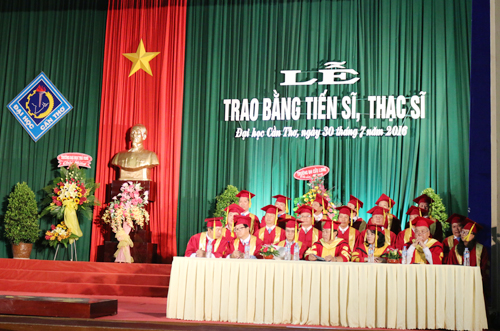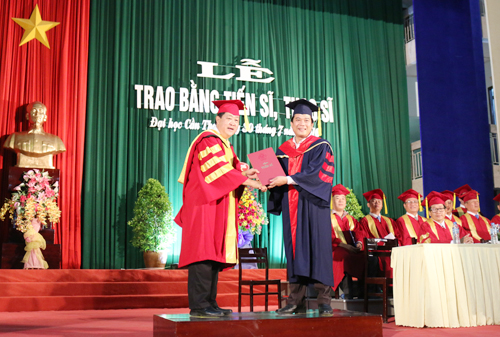
Tên đề tài: “Giám sát ủy quyền và rủi so sai hẹn trong tín dụng nhóm cho nông hộ tại Đồng bằng sông Cửu Long”
Tác giả: Trần Bá Trí, Khóa: 2019
Chuyên ngành: Tài chính- Ngân hàng; Mã số: 9340201; Nhóm ngành: Kinh doanh và quản lý
Người hướng dẫn chính: PGS.TS. Trương Đông Lộc - Trường Đại học Cần Thơ
- Tóm tắt nội dung luận án
Mục tiêu của luận án là nghiên cứu tác động của việc giám sát ủy quyền được thực hiện bởi tổ trưởng đến rủi ro sai hẹn của tổ viên và của cả tổ trong mô hình cho vay theo Tổ Tiết kiệm và vay vốn (TK&VV) của Ngân hàng Chính sách xã hội Việt Nam (VBSP) thông qua vận dụng Lý thuyết bất cân xứng thông tin, Lý thuyết đại diện, các lý thuyết về mô hình giám sát đồng đẳng và giám sát ủy quyền trong tín dụng nhóm để luận giải về các mối quan hệ này. Dữ liệu sơ cấp được sử dụng trong luận án này được thu thập từ 224 tổ TK&VV tại 5 tỉnh An Giang, Bạc Liêu, Đồng Tháp, Hậu Giang và Tiền Giang tại Đồng bằng Sông Cửu Long. Trong mỗi tổ có 3 người được chọn để phỏng vấn bao gồm 1 tổ trưởng và 2 tổ viên (được chọn ngẫu nhiên) với tổng cộng 672 người trả lời.
Có 2 mô hình ước lượng được sử dụng trong luận án. Mô hình Tobit được sử dụng để kiểm định mối quan hệ giữa hoạt động giám sát ủy quyền bởi tổ trưởng đến rủi ro sai hẹn của cả tổ. Mô hình Logit được sử dụng để kiểm định mối quan hệ giữa hoạt động giám sát ủy quyền được thực hiện bởi tổ trưởng đến rủi ro sai hẹn của tổ viên. Kết quả của mô hình chứng minh rằng có bằng chứng rõ ràng về tác động của giám sát ủy quyền đến rủi ro sai hẹn của tổ viên và của cả tổ. Đặc biệt là 2 biến tỷ lệ hoa hồng cho tổ trưởng và cỡ tổ, đại diện lần lượt cho động lực giám sát bởi tổ trưởng và quy mô giám sát. Trong khi đó, hoạt động sàng lọc, giám sát đồng đẳng, và thúc ép trả nợ không có tương quan đến rủi ro sai hẹn trong chương trình cho vay này. Dựa vào kết quả của các mô hình ước lượng, một số khuyến nghị cho VBSP, cho chính quyền địa phương và cho các Đoàn/Hội đã được đưa ra trong việc thiết kế tổ, lựa chọn tổ trưởng, và lựa chọn tổ viên.
- Những kết quả mới của luận án
Hoạt động giám sát ủy quyền trong tín dụng nhóm rất ít được nghiên cứu ở Việt Nam và trên thế giới. Trên thế giới chỉ mới nghiên cứu về giám sát ủy quyền bởi bên thứ ba là các tổ chức tài chính vi mô (MFI) độc lập với bên cho vay và bên đi vay. Các nghiên cứu trên thế giới về tín dụng nhóm đa số đều tập trung vào giải thích kết quả trả nợ dựa trên hoạt động sàng lọc, giám sát đồng đẳng, giám sát bởi tổ trưởng và thúc ép trả nợ ở các nhóm chịu trách nhiệm liên đới. Nghiên cứu của luận án này ở nhóm cho vay chịu trách nhiệm cá nhân, vốn ít được nghiên cứu trên thế giới.
Các nghiên cứu trước đây về giám sát ủy quyền bởi tổ trưởng ở tín dụng nhóm chủ yếu tập trung vào các biến về thông tin mà tổ trưởng có được để giải thích cho hoạt động giám sát bởi tổ trưởng tác động như thế nào đến rủi ro hoặc khả năng trả nợ của nhóm. Luận án này đã nghiên cứu trực diện hơn về động lực giám sát bởi tổ trưởng đã tác động như thế nào đến rủi ro của cả tổ và của các thành viên trong tổ. Việc sử dụng các biến định lượng đo lường động lực và quy mô giám sát giúp cho việc giải thích tác động của giám sát ủy quyền đáng tin cậy hơn.
- Các ứng dụng/khả năng ứng dụng trong thực tiễn, các vấn đề cần tiếp tục nghiên cứu
Kết quả luận án này giúp cho VBSP, các Đoàn/Hội và chính quyền địa phương những thông tin có giá trị trong thiết kế tổ vay vốn phù hợp hơn về cỡ tổ, về không gian hoạt động của một tổ, về hoa hồng cung cấp cho tổ trưởng. Luận án cũng đưa ra những khuyến nghị trong lựa chọn tổ trưởng và tổ viên dựa trên những đặc điểm kinh tế-xã hội của tổ trưởng và tổ viên. Từ đó giúp cải thiện hiệu quả hoạt động của tổ TK&VV.
Một số đề xuất cho các nghiên cứu trong tương lai;
- Do đại dịch Covid-19 gây khó khăn cho việc đi lại thu thập số liệu nên địa bàn nghiên cứu bị hạn chế. Các nghiên cứu sau nên mở rộng địa bàn ra nhiều tỉnh hơn trong vùng hoặc cả nước để kết quả giải thích có tính tổng quát hơn.
- Do người dân trong vùng không có thói quen ghi chép nên việc thu thập số liệu trong nhiều năm và nhiều kỳ gặp khó khăn. Vì vậy, luận án này chỉ có số liệu thời điểm. Tuy nhiên, Covid-19 có thể gây ra vấn đề nội sinh vì cùng lúc tác động đến nợ quá hạn, đến thu nhập và đến hoạt động giám sát bởi tổ trưởng. Các nghiên cứu sau này nên sử dụng số liệu thu thập ở nhiều thời điểm khác nhau để làm rõ liệu có hay không tác động của đại dịch Covid-19 đến vấn đề nội sinh, và cũng có thể cho ra kết quả đáng tin cậy hơn.
Các nghiên cứu trong tương lai nên nghiên cứu thêm về hiệu ứng cam kết có liên quan đến tổ trưởng, tổ viên, VBSP, và các Đoàn/Hội để mở rộng hơn và bổ sung thêm những tài liệu hiện có.
Thesis title: DELEGATED MONITORING AND DELINQUENCY RISK IN GROUP LENDING FOR RURAL HOUSEHOLDS IN MEKONG DELTA REGION
- Major: FINANCE-BANKING Code: 9340201
- Full name of PhD student: TRẦN BÁ TRÍ Year: 2019 round 2
- Scientific supervisor: Assoc.Prof. TRƯƠNG ĐÔNG LỘC
- Educational institution: CẦN THƠ UNIVERSITY
- Content of thesis summary
This dissertation investigates the impact of delegated monitoring by group leaders on individual loan delinquency of ordinary members and overall group delinquency rates within the Lending and Saving Group (LSG) scheme administered by the Vietnam Bank for Social Policies (VBSP). The analysis is theoretically grounded in information asymmetry theory, principal-agent theory, peer and delegated monitoring models, and transaction cost theory as applied to microcredit, to elucidate these relationships. Primary data were collected from 224 LSGs across five provinces in the Mekong Delta region: An Giang, Bac Lieu, Dong Thap, Hau Giang, and Tien Giang. Within each group, semi-structured interviews were conducted with three individuals: the group leader and two randomly selected ordinary group members, yielding a total of 672 respondents.
Two distinct estimation models were employed in this dissertation. A Tobit regression model was utilized to analyze the relationship between delegated monitoring and group delinquency rates. Complementarily, a Logit regression model was used to test the impact of delegated monitoring on the likelihood of loan delinquency among ordinary members. The findings provide robust evidence indicating that delegated monitoring exerts a significant influence on the probability of loan delinquencies. Specifically, two key variables – the commission rate for the group leader and group size, representing the group leader's monitoring incentive and workload, respectively – demonstrated statistically significant effects. Conversely, screening mechanisms, peer monitoring activities, and peer pressure did not exhibit a statistically significant correlation with loan delinquency. Based on these empirical results, several policy recommendations are proposed for VBSP, local authorities, and socio-political organizations concerning group design and the selection processes for group leaders and members.
- The novel aspects from the thesis
Delegated monitoring in group lending has received limited scholarly attention both in Vietnam and internationally. Global research has primarily focused on delegated monitoring by third-party Microfinance Institutions (MFIs) that operate independently of both lenders and borrowers. Studies from other countries on group lending have largely concentrated on explaining repayment outcomes based on screening, peer monitoring, group leader monitoring, and repayment enforcement in joint-liability groups. This dissertation's research focuses on individual-liability lending groups, a model that has been under-researched globally.
Prior studies on delegated monitoring by group leaders in group lending have mainly concentrated on the information variables available to group leaders (proxy variables) to explain how their monitoring activities impact group risk or repayment ability. This dissertation takes a more direct approach by investigating how the monitoring incentives of group leaders affect the risk of both the entire group and individual members. The use of quantitative variables measuring monitoring incentives and scale enhances the reliability of the explanation regarding the impact of delegated monitoring.
- Application prospect and suggestions for further study
The findings of this dissertation offer valuable insights for VBSP, mass organizations (such as unions and associations), and local authorities in designing more effective lending groups. These insights pertain to optimal group size, the geographical scope of group operations, and the commission structure for group leaders. The dissertation also provides recommendations for the selection of group leaders and members based on their socio-economic characteristics, thereby contributing to the enhanced operational efficiency of LSGs.
+ Suggestions for future research:
- Due to the logistical challenges in data collection caused by the Covid-19 pandemic, the research area was limited. Future studies should expand the geographical scope to include more provinces within the region or nationwide to enhance the generalizability of the findings.
- Given the lack of consistent record-keeping among residents in the study area, collecting multi-year and multi-period data was difficult. Consequently, this dissertation relies on cross-sectional data. However, Covid-19 may introduce endogeneity issues by simultaneously affecting loan delinquency, income, and monitoring activities by group leaders. Subsequent research should utilize data collected at multiple time points to clarify the potential impact of the Covid-19 pandemic on endogeneity and to yield more robust and reliable results.
- Future research should further explore the commitment effects involving group leaders, members, VBSP, and mass organizations to broaden the scope and contribute to the existing body of knowledge.
- Xem chi tiết nội dung luận án
- Xem thông tin đăng tải tại Website Bộ giáo dục và Đào tạo. (Nhập tên NCS vào ô tìm kiếm)

